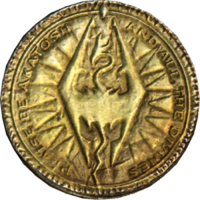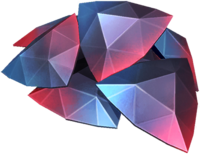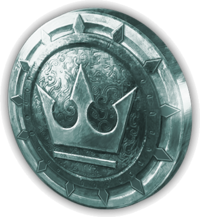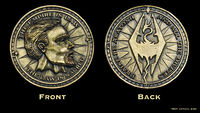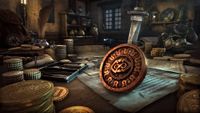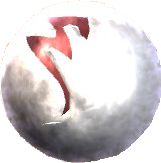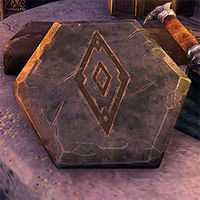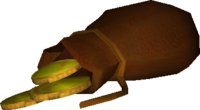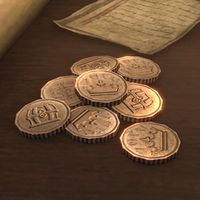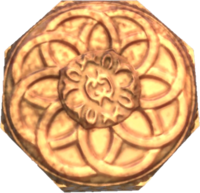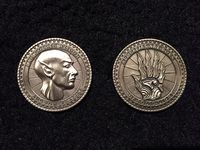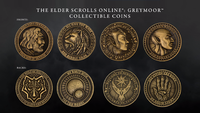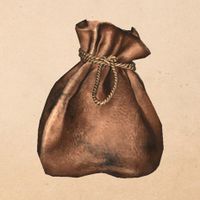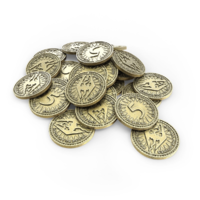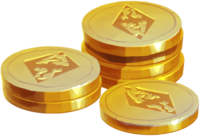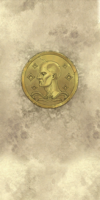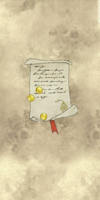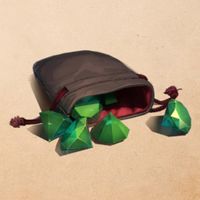Lore:Currency
Many different currencies have been used by the mortals of Tamriel, although the primary form of currency is gold coinage. Gold coins have generally been universally accepted throughout the eras and across different planes of existence.
Contents
Alliance Points[edit]
Alliance Points were the name of a form of scrip (a substitute for legal tender) paid out by the three Alliances for participation in the Three Banners War. Battlefield merchants of the Aldmeri Dominion, Daggerfall Covenant, and Ebonheart Pact would accept these tokens as payment for goods. They were also adopted by the Circle of Champions as a reward for participation in gladiatorial combat. The tokens themselves resembled green gems in the shape of the Red Diamond, marked with the Red Dragon symbol on one side.[1]
Archival Fortunes[edit]
Archival Fortunes are a form of currency used in the Infinite Archive, a border realm of Apocrypha. They are soul-forged currency, taking the form of eye-focused signets. Both Daedra and mortal scholars dwelling in the Infinite Archive utilize them for trade. Magical analysis unmistakably reveals the incorporation of soul gems in crafting these distinctive signets. A clear connection exists between comprehending the aetheric index at the core of the Archive and acquiring these iconic signets, likely explaining their value within that realm's confines. Archival Fortunes were frequently employed as rewards for individuals who carried out tasks for the hierophant and other denizens of the archive, such as halting the invasion of Tho'at Replicanum, slaying Fabled and Marauder maligraphies, or helping with restoring the lost pieces of literature, such as Fynboar the Resurrected, or Theories on Apocrypha. Exclusive exotic goods were often available for purchase solely using these fortunes within the Archive.
Gabrielle Benele of the University of Gwylim was known for delving into the research of the Archival Fortunes.
Atronite[edit]
Shards of Atronite have been known to be used as an exotic form of currency on occasion.[2]
Bronze[edit]
Although bronze coins do exist, they are not commonly used as currency.[3]
Crowns[edit]
Crowns are silvery coins named for the crown marking minted on one side. Some merchants will accept it as a form of currency in return for exotic goods.[4][5][6]
Crown Coins[edit]
Crown Coins are cut red gemstones named for the crown marking engraved on one side. They are used as a form of rare currency.[7]
Crown Gems[edit]
Crown Gems are cut purple gemstones named for the crown marking engraved on one side. The Gold Coast Trading Company offered these gems in compensation for unwanted purchased goods, to be used as a method of exchange.[8][9][10]
Dwemer Coins[edit]
Dwemer Coins are artifacts left behind by the vanished Dwemer race. The Dwemer used these octagonal metallic grey coins instead of or in addition to gold. Treasure hunters who come across these coins can sell them for a high price, although this can be a dangerous endeavor, as angry Dwarven spectres may attack looters who attempt to take them.[11]
Event Tickets[edit]
Event Tickets were a form of currency accepted by the Impresario, a mysterious and eccentric Second Era merchant who offered exotic goods in return for stories of heroic feats.[12] These experiences were denominated using these pink tickets, which could then be exchanged at the Impresario's traveling stall.[13][14] The source of her immense stores of wealth was subject to much speculation at the time.[12]
Gems[edit]
Cut green gems are sometimes used as a form of rare currency in the Bloodfall Kingdom and its neighboring kingdom.[15][16]
Gold[edit]
Gold, also referred to as septims or drakes following the conquests of Tiber Septim, is the main form of currency. As the name would imply, these round coins are made from gold, a precious metal. It is used across the entire continent of Tamriel and beyond, including otherworldly trading hubs such as Fargrave, New Sheoth, the Hollow City, the Brass Fortress, and Wretched Spire.[17][18] It has been referred to as "Nirni-gold" by Khajiit denizens of Oblivion.[19]
By the Third and Fourth Eras, gold coins were commonly referred to as septims or drakes due to the markings minted on all coins by the Third Empire: the obverse displays the face of Emperor Tiber Septim, with the words "THE EMPIRE IS LAW" and "THE LAW IS SACRED"; the reverse displays the Red Dragon symbol (or 'drake'), with the words "PRAISE BE AKATOSH AND ALL THE DIVINES".
In centuries prior, the mint marks on gold coins were less consistent. The Second Empire minted coins with the Red Diamond symbol on one side.[20] The First Aldmeri Dominion also minted their own gold coins, bearing a face on one side.[21] Other coins had a crown symbol on one side and a chest symbol representing a bank on the other.[18]
Banks can offer loans or letters of credit denominated in gold.[22] Such promissory notes are sometimes known as a writ of coin.[23]
King Orgnum's Coffer is a legendary enchanted chest said to contain unlimited gold coins.[24]
Seals of Endeavor[edit]
Seals of Endeavor are bronze-colored coins made from a precious mix of metals, with a triskele marking on one side and an infinity sign in the center. They are awarded to those with an adventurous spirit for carrying out particular endeavors, and may be accepted as a currency by some merchants in place of Crown Gems.[25]
Sigils[edit]
Sigils have been known to be used as a form of currency on occasion. The Warrior brought a great number of these Daedric glyphs back to Tamriel from beyond a mysterious portal outside the town of Rivercrest.[26]
Silver[edit]
Although silver coins or pieces do exist, they are not commonly used as currency.[27][28]
Tel Var Stones[edit]
- Main article: Tel Var Stones
Tel Var Stones are esoteric fragments of the White-Gold Tower, scraped away by Molag Bal's Daedric minions during their occupation of the Imperial City.[29] As part of Bal's attempted Planemeld, a Dark Anchor was opened above the White-Gold Tower, and the Daedra began to chip away pieces of the Tower in order to weaken the barriers between Mundus and Coldharbour.[30][31]
The stones resemble hexagonal blue or grey coins with the Red Diamond symbol engraved on one side.[29] Tel Var Stones contain a dormant power dating back to the Tower's construction by the Ayleids, who settled for Tel Var after they failed to create their own Zero Stone.[30][31] Merchants within the Imperial City accepted Tel Var as a form of currency during the three alliances' invasion of the City as part of the wider Three Banners War.[29]
Gallery[edit]
Gold with Reman's visage (Tales of Tribute)
References[edit]
- ^ Alliance Points in ESO
- ^ Atronite in Castles
- ^ Footpad's Coin
- ^ The Gold Road: A Merchant's Journey — Tacitan Vano
- ^ Crown Store in ESO
- ^ Elder Scrolls Online - Crown Store Showcase
- ^ Crown Coins in Legends Asia
- ^ Crown Gems in ESO
- ^ Crown Store Showcase - Crown Crates
- ^ Pacrooti's dialogue in ESO
- ^ Dwemer Coins in Morrowind
- ^ a b Meet the Character - The Impresario — Philius Dormier
- ^ The Impresario's dialogue in ESO
- ^ Event Tickets in ESO
- ^ Gems in Blades
- ^ Gems in Castles
- ^ Gold in Skyrim
- ^ a b Gold in ESO
- ^ Cipher Huzmargo's dialogue in ESO
- ^ Suspicious Coin
- ^ Token
- ^ Banks in Daggerfall
- ^ Treasury deck in Tales of Tribute
- ^ King Orgnum's Coffer in Arena
- ^ Seals of Endeavor in ESO
- ^ Sigils in Blades
- ^ Prowler's Coin
- ^ M'Sharra's Confession
- ^ a b c Tel Var Stones in ESO
- ^ a b Phrastus of Elinhir's dialogue in ESO
- ^ a b Lady Cinnabar's dialogue in ESO
